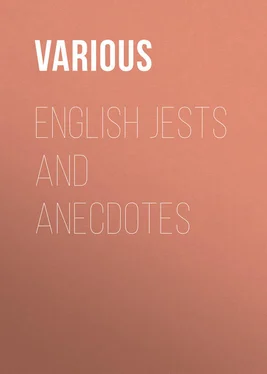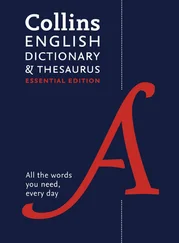Various - English Jests and Anecdotes
Здесь есть возможность читать онлайн «Various - English Jests and Anecdotes» — ознакомительный отрывок электронной книги совершенно бесплатно, а после прочтения отрывка купить полную версию. В некоторых случаях можно слушать аудио, скачать через торрент в формате fb2 и присутствует краткое содержание. Жанр: foreign_humor, Анекдоты, на английском языке. Описание произведения, (предисловие) а так же отзывы посетителей доступны на портале библиотеки ЛибКат.
- Название:English Jests and Anecdotes
- Автор:
- Жанр:
- Год:неизвестен
- ISBN:нет данных
- Рейтинг книги:3 / 5. Голосов: 1
-
Избранное:Добавить в избранное
- Отзывы:
-
Ваша оценка:
- 60
- 1
- 2
- 3
- 4
- 5
English Jests and Anecdotes: краткое содержание, описание и аннотация
Предлагаем к чтению аннотацию, описание, краткое содержание или предисловие (зависит от того, что написал сам автор книги «English Jests and Anecdotes»). Если вы не нашли необходимую информацию о книге — напишите в комментариях, мы постараемся отыскать её.
English Jests and Anecdotes — читать онлайн ознакомительный отрывок
Ниже представлен текст книги, разбитый по страницам. Система сохранения места последней прочитанной страницы, позволяет с удобством читать онлайн бесплатно книгу «English Jests and Anecdotes», без необходимости каждый раз заново искать на чём Вы остановились. Поставьте закладку, и сможете в любой момент перейти на страницу, на которой закончили чтение.
Интервал:
Закладка:
Foote being at a nobleman’s house, his lordship, as soon as dinner was over, ordered a bottle of Cape to be set on the table, which, after magnifying its good qualities, and in particular, its age , he sent round the table in glasses that scarcely held a thimble-full. “Fine wine, upon my soul,” says the wit, tasting, and smacking his lips. “Is it not very curious?” says his lordship. “Perfectly so, indeed,” says the other; “I do not remember to have seen anything so little of its age in my life before.”
Foote, meeting at Bath, his old acquaintance, Major B – (a character well known in the annals of gaming), came up to him, and asked him, with great cordiality, how he was? “Ah, Foote,” says the other, “I have had a terrible accident since I saw you last; no less than the loss of an eye.” “My dear fellow,” says the wit, “I am heartily sorry for it: pray, at what game?”
A well beneficed old parson being at a public dinner, he entertained them with nothing else but the situation and profits of his parochial livings, which last, he said, he kept entirely to himself. The company in general despised him too much to make any remarks on his egotisms; but Quin being of the party, and observing the parson, as he stretched across the table, to shew a pair of very dirty yellow hands, he immediately called out, – “So, so, doctor, I think you do keep your glebe in your own hands.”
The late Duke of York once remarked to Colonel W. at the mess of the 11th regiment, that the colonel was uncommonly bald, and, although a younger man than his royal highness, he stood in more need of a wig. The colonel, who had been of very long standing in the service, and whose promotion had been by no means rapid, informed his royal highness that his baldness could be very easily accounted for. “In what manner?” asked his royal highness, rather eagerly. To which Colonel W. replied, “By junior officers stepping over my head.” The duke was so pleased with the reply, that the gallant colonel obtained promotion in a few days afterwards.
When Brummell was the great oracle on coats, the Duke of Leinster was very anxious to bespeak the approbation of the “Emperor of the Dandies,” for a “cut” which he had just patronised. The duke, in the course of his eulogy on his Schneider, had frequently occasion to use the words “my coat.” “Your coat, my dear fellow!” said Brummell, “what coat?” “Why, this coat,” said Leinster; “this coat that I have on.” Brummell, after regarding the vestment with an air of infinite scorn, walked up to the duke, and, taking the collar between his finger and thumb, as if fearful of contamination, said, “What! duke, do you call that thing a coat?”
Counsellor C – being very infirm and goutified from his excesses, meeting one day with an old friend of his, a permit officer of the custom-house, the latter asked how he did? “Ah?” says the counsellor, “you will not have me long amongst you.” “Come, come,” says the other, “do not be cast down; you shall not have a permit to die yet a while.” “Shall not I, indeed?” says the counsellor; “why, then, I would have you keep a sharp look-out for death; for, if you don’t, I am afraid he will smuggle me.”
The Puritans carried their peculiar tenets into the minutest affairs of life. When Lord Brook, one of the number played at bowls, he would sometimes run after his cast, and cry, “Rub, rub, rub,” in the eager, but absurd hope that such a cry would give effect to his play. On such occasions, his chaplain would run after him with equal eagerness, and earnestly exclaim, “Oh, good my lord, you must leave that to God.”
A bishop of Lincoln adopted the strange conceit of having the grand Scripture sentence, “Fiat Lux,” painted on all the windows of his house. In his hall, in particular, it was so thickly painted, that the reverse of the command was observable, and, as a wag remarked, you could scarcely see for light. A mad scholar, at last, happened to wait upon the bishop, and, observing the opacity of the light, fell a-breaking the windows with his stick. Being carried by the servants into the presence of the bishop, and questioned as to the cause of his conduct, “Why, my lord,” answered he, “I was only obeying your lordship’s commands: Fiat Lux .”
A young preacher, in the time of James I., being appointed to hold forth before the vice-chancellor and heads of the colleges of Oxford, chose for his text, “What! cannot you watch one hour?” which carried a personal allusion, as the vice-chancellor happened to be one of those heavy-headed persons who cannot attend church without falling asleep. The preacher repeating his text in an emphatic manner, at the end of every division of his discourse, the unfortunate vice-chancellor as often awoke; and this happened so often, that, at last, all present could very well see the joke. The vice-chancellor was so nettled at the disturbance he had met with, and the talk it occasioned, that he complained to the Archbishop of Canterbury, who immediately sent for the young man, to reprove him for what he had done. In the course of the conference which ensued between the archbishop and the preacher, the latter gave so many proofs of his wit and good sense, that his grace procured him the honour of preaching before the king. Here also he had his joke: he gave out his text in these words, – “James First and Sixth, Waver not ;” which, of course, everybody present saw to be a stroke at the indecisive character of the monarch. James, equally quick-sighted, exclaimed, “He is at me already;” but he was upon the whole so well pleased with this clerical wag, as to make him one of his chaplains in ordinary. He afterwards went to Oxford, and preached a farewell sermon on the text, “Sleep on now, and take your rest.”
It sometimes happens that a candidate for admission into a society, or club, finds every individual member to whom he speaks during the canvass agreeable to his wishes; but when the day of ballot arrives, discovers that there is a majority of black balls. We would recommend to the attention of all such unhappy individuals, the practical joke which a curate once played off under similar circumstances. Being a candidate for some vacant benefice, which was at the disposal of the clergy of the district, he sounded them all beforehand as to their disposition to serve him, and found each more disposed to favour and support him than another. When they met, however, to deliberate on the subject in full synod, he found himself by no means so well treated. Afraid that he should lose his election, he invited the whole to a feast. They, knowing that he should be unable to provide for them from his own resources, sent, as was customary, each a certain portion of the materials of the entertainment – one fish, another flesh, a third wine, a fourth oil, and so forth. The whole he boiled together in one kettle. Of course, when the guests were all arranged, and the food brought in, it was found to be the most unpalatable stuff in the world. They asked what sort of food this was, and he answered with oblique veracity, that it was what they had sent to him. “Ah,” said they, “but what, if cooked each thing by itself, and presented in a separate dish, would have been very good, it is quite disgusting in this hotch-potch style.” “Just so are ye to me,” replied the host; “you are very fair and kind to me when single, and one by one; but when you are gathered together, you are the most disagreeable people in the whole world.”
Читать дальшеИнтервал:
Закладка:
Похожие книги на «English Jests and Anecdotes»
Представляем Вашему вниманию похожие книги на «English Jests and Anecdotes» списком для выбора. Мы отобрали схожую по названию и смыслу литературу в надежде предоставить читателям больше вариантов отыскать новые, интересные, ещё непрочитанные произведения.
Обсуждение, отзывы о книге «English Jests and Anecdotes» и просто собственные мнения читателей. Оставьте ваши комментарии, напишите, что Вы думаете о произведении, его смысле или главных героях. Укажите что конкретно понравилось, а что нет, и почему Вы так считаете.












